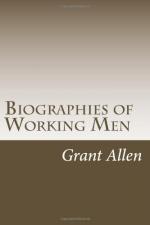At Datchet, Herschel not only made several large telescopes for sale, for which he obtained large prices, but he also got a grant of 2000 pounds from the king to aid him in constructing his huge forty-foot instrument. It was here, too, in 1783, that Herschel married. His wife was a widow lady of scientific tastes like his own, and she was possessed of considerable means, which enabled him henceforth to lay aside all anxiety on the score of money. They had but one child, a son, afterwards Sir John Herschel, almost as great an astronomer as his father had been before him. In 1785, the family moved to Clay Hall, in Old Windsor, and in 1786 to Slough, where Herschel lived for the remainder of his long life. How completely his whole soul was bound up in his work is shown in the curious fact recorded for us by Carolina Herschel. The last night at Clay Hall was spent in sweeping the sky with the great glass till daylight; and by the next evening the telescope stood ready for observations once more in the new home at Slough.
To follow Herschel through the remainder of his life would be merely to give a long catalogue of his endless observations and discoveries among the stars. Such a catalogue would be interesting only to astronomers; yet it would truly give the main facts of Herschel’s existence in his happy home at Slough. Honoured by the world, dearly loved in his own family, and engrossed with a passionate affection for his chosen science, the great astronomer and philosopher grew grey in peace under his own roof, in the course of a singularly placid and gentle old age. In 1802 he laid before the Royal Society a list of five thousand new stars, star-clusters, or other heavenly bodies which he had discovered, and which formed the great body of his personal additions to astronomical knowledge. The University of Oxford made him Doctor of Laws, and very late in life he was knighted by the king—a too tardy acknowledgment of his immense services to science. To the very last, however, he worked on with a will; and, indeed, it is one of the great charms of scientific interest that it thus enables a man to keep his faculties on the alert to an advanced old age. In 1819, when Herschel was more than eighty, he writes to his sister a short note—“Lina, there is a great comet. I want you to assist me. Come to dine and spend the day here. If you can come soon after one o’clock, we shall have time to prepare maps and telescopes. I saw its situation last night. It has a long tail.” How delightful to find such a living interest in life at the age of eighty!




